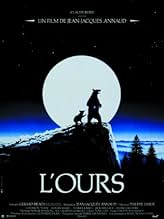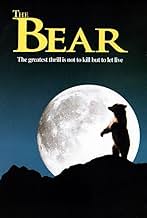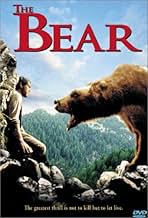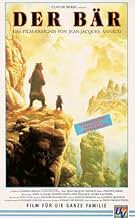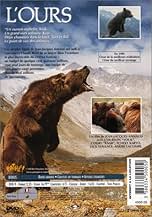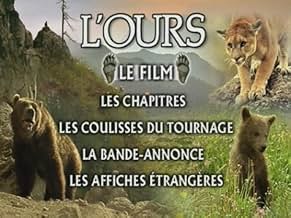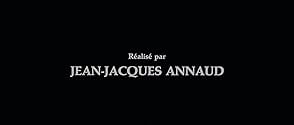- Nominated for 1 Oscar
- 5 wins & 11 nominations total
- Director
- Writers
- All cast & crew
- Production, box office & more at IMDbPro
Featured reviews
Almost 20 years later, this remains the best of "animal" movies I've ever seen - where there is little dialog and animals dominate the screen. The amazing photography with the bears, the stunning cinematography overall and the great landscape (British Columbia) all make this a visual treat. Even better, it's an interesting story and has remained that with each of the viewings I've had of this film since discovering it in the mid '90s.
It's a solid adventure story, and the little bear in here is lovable. The "bad guys" (the hunters) aren't really all that bad, either. The bears' performances are fascinating, simply amazing. It must have taken incredible patience to film this movie.
Outside of a couple of "damns," there is no profanity and, I would think, is a great film for any age person to see. Highly recommended.
It's a solid adventure story, and the little bear in here is lovable. The "bad guys" (the hunters) aren't really all that bad, either. The bears' performances are fascinating, simply amazing. It must have taken incredible patience to film this movie.
Outside of a couple of "damns," there is no profanity and, I would think, is a great film for any age person to see. Highly recommended.
We rarely see in our contemporary world simple, subtle films regarding nature which in turn give us a true essence of the meaning and beauty of life. All we absorb out of proportion day by day from watching television and films is the violence, vulnerability and sexual tendencies of the human being. The 60's and 70's were infested with the drugs and sex appeal trend and the 80's crammed more action macho flicks than one can count sheep. However, it was the 90's and the turn of the millennium that exploded into the CGI craze and destroyed the film industry, reducing it into a commercial quick-produce supermarket in which quality films came close to none-existent and where violence was more popular than ever before.
A rare example of subtle contemporary masterful film making is 'L'Ours', better known in English translation as 'The Bear'. Jean-Jacques Annaud, the man behind the most extraordinary of prehistoric based films, 'Quest For Fire', stunned the world with his unparalleled mesmerizing vision of a natural world destroyed by man in what virtually is a film without dialogue. Yet it is an experience that will play with your emotions and warm your heart, right up to the chilling finale.
The story is set around the 1800's and revolves around an orphaned bear cub and its struggle to survive the harsh wilderness of British Columbia following the death of its mother. Alone and with no survival skills, the bear cub must learn the necessities of life the hard way. That is until it meets a tough, lone, but wounded Grizzly bear whose endeavor to survive is all the same after mountain hunters, blinded by their hunger for wealth, pursue their valuable skins. The two Grizzlies form a bond more powerful than the guns that pursue them in which the cub learns all the hardships of life first hand and grows to stand up for itself against the vast, relentless world that it lives in. Does man, the pursuer, become one with nature and understand the value of life?
Very few films without dialogue have captured the imagination that 'The Bear' has inscribed in my memory. Following the film's conclusion, I made a pledge to myself that one day I will be going to British Columbia myself. The cinematography was excruciatingly beautiful - I felt like I was there throughout the whole duration of the picture. The music was so uplifting and poignant throughout, that it completely drained me of my emotions - especially the finale!
Tcheky Karyo (famous French actor) playing one of the hunting mountain men who comes to terms with nature, plays his role convincingly, but there was no better performance than that of the starring bear cub and its much larger assistant. Their commanding presence leaves us laughing, crying and despising. All were simply natural expressions and worked on a documentary level, giving this film immaculate credibility.
The subtlest of all films I have ever seen, I recommend this to anybody who likes the occasional escape from reality to a world where life makes all the more sense. A definitive addition in my collection and an escape I will be taking for years to come. A masterwork of epic proportions and a classic in its genre. May the film industry bestow upon us more of these pleasures in the near future!
A rare example of subtle contemporary masterful film making is 'L'Ours', better known in English translation as 'The Bear'. Jean-Jacques Annaud, the man behind the most extraordinary of prehistoric based films, 'Quest For Fire', stunned the world with his unparalleled mesmerizing vision of a natural world destroyed by man in what virtually is a film without dialogue. Yet it is an experience that will play with your emotions and warm your heart, right up to the chilling finale.
The story is set around the 1800's and revolves around an orphaned bear cub and its struggle to survive the harsh wilderness of British Columbia following the death of its mother. Alone and with no survival skills, the bear cub must learn the necessities of life the hard way. That is until it meets a tough, lone, but wounded Grizzly bear whose endeavor to survive is all the same after mountain hunters, blinded by their hunger for wealth, pursue their valuable skins. The two Grizzlies form a bond more powerful than the guns that pursue them in which the cub learns all the hardships of life first hand and grows to stand up for itself against the vast, relentless world that it lives in. Does man, the pursuer, become one with nature and understand the value of life?
Very few films without dialogue have captured the imagination that 'The Bear' has inscribed in my memory. Following the film's conclusion, I made a pledge to myself that one day I will be going to British Columbia myself. The cinematography was excruciatingly beautiful - I felt like I was there throughout the whole duration of the picture. The music was so uplifting and poignant throughout, that it completely drained me of my emotions - especially the finale!
Tcheky Karyo (famous French actor) playing one of the hunting mountain men who comes to terms with nature, plays his role convincingly, but there was no better performance than that of the starring bear cub and its much larger assistant. Their commanding presence leaves us laughing, crying and despising. All were simply natural expressions and worked on a documentary level, giving this film immaculate credibility.
The subtlest of all films I have ever seen, I recommend this to anybody who likes the occasional escape from reality to a world where life makes all the more sense. A definitive addition in my collection and an escape I will be taking for years to come. A masterwork of epic proportions and a classic in its genre. May the film industry bestow upon us more of these pleasures in the near future!
10trams98
I saw only a small part of this movie on TV recently but found it compelling enough to spend an hour on the Internet trying to find out its title and then rented it as 'The Bear'.
It was worth the effort. What a refreshing change from the parade of Hollywood block busters. An orphaned bear cub is the star along with an adult Kodiak bear. They are being hunted by two men with guns and dogs in a breathtaking never ending landscape where no dialogue is needed. Appropriately, one of the few lines of dialogue has one of the hunters refer to himself as a "stupid human".
I wondered how on earth some of the shots were achieved but not too much, the story is too compelling. "The Bear" is an enchanting glimpse into a world few people ever witness and a cautionary tale for hunters everywhere.
It was worth the effort. What a refreshing change from the parade of Hollywood block busters. An orphaned bear cub is the star along with an adult Kodiak bear. They are being hunted by two men with guns and dogs in a breathtaking never ending landscape where no dialogue is needed. Appropriately, one of the few lines of dialogue has one of the hunters refer to himself as a "stupid human".
I wondered how on earth some of the shots were achieved but not too much, the story is too compelling. "The Bear" is an enchanting glimpse into a world few people ever witness and a cautionary tale for hunters everywhere.
I have this on video but have not watched it for quite some time, the other night I watched it again and was of course entranced. The director has captured perfectly the life of the cub. If I have one gripe it is the use of a "human" voice for the emotions of the cub, in many scenes it is fairly obvious that it is a human being trying to express the emotions of the cub at the time. Secondly, while I understand the storyline of the hunters being integral to the film to be honest I felt that every scene with humans involved was boring beyond belief and I couldn't wait for it to be over. Overall this movie is a sheer joy to behold and the final scene where the cub finally goes to sleep without nightmares is pure bliss. You have to live with animals and know animals to realize how impressive this movie is and I firmly believe that the director has captured pure magic on film. Don't miss it.
At last a movie that seriously attempts to portray the world from a non-human point of view! It's a leap of the imagination that many of us, I'm sure, have never even contemplated. This beautifully-filmed movie, marketed as a kids' film, cannot of course undertake such a task without a few failures here and there; but whatever lapses into anthropomorphism there may be can be readily excused if one compares The Bear with, say, Milo and Otis (cringe).
The story, set in late nineteenth-century British Columbia, revolves around two bears; a young orphan and the huge male who adopts him. Much of the film has no human speech, viewers instead having to interpret the body language and sounds of wild animals. The photography is so impressive and the editing so nicely done that this is a fascinating process, reminding us just how much we as a species have in common with other animals. We can even identify with the bears' diet; they are omnivorous, as are we. Their physical actions and expressions of emotion make a compelling comparison with our own behaviour, and the filmmakers have done their utmost to retain as "natural" a feel as possible to such scenes.
The appearance of human beings, two bear hunters, comes almost as a shock after immersion in the simple world of the bears. The hunters are animals too, but unlike the bears they interact clumsily with the breathtaking wilderness in which they move; their predatory intelligence and use of weaponry have to compensate for their physical vulnerability. They are clearly aliens in an unfriendly environment, though they move as if they were the only creatures of importance within it. Bearskins are piled high in their camp, their little bastion of safety in the untamed wilderness.
These two worlds do of course collide. The hunters, in their arrogance, bite off more than they can chew when a poorly-managed encounter with the male adult bear leads them to pursue a vendetta against him. They capture the young cub to keep the adult in the area, then systematically set out to kill the creature that has caused them so much inconvenience. But the hunters have at last come up against an enemy that seems like the personification of an offended Mother Nature. In an absolutely convincing and spine-chilling scene, one of the hunters comes face to face with the reality of his position in the scheme of things in a manner in which he, and we who watch, will never forget. His teacher is The Bear; the young hunter leaves the mountains a fundamentally changed man. I have never seen the necessity of respect for our fellow creatures more ably communicated.
The movie ends with the focus once more on the young cub, who must find within himself the first glimmerings of the power his adult protector so effortlessly exudes. The humans have gone: the bears live on, their wild world unchanged by their encounter with the strange two-legged creatures that dared to intrude so unwisely into their affairs.
This beautiful and at times awe-inspiring movie is rated as children's viewing, but I would not recommend it for younger viewers. Older children and adults, however, can learn and gain much from this poignant and fascinating film. Hats off to the filmmakers, they have done their subject justice indeed.
The story, set in late nineteenth-century British Columbia, revolves around two bears; a young orphan and the huge male who adopts him. Much of the film has no human speech, viewers instead having to interpret the body language and sounds of wild animals. The photography is so impressive and the editing so nicely done that this is a fascinating process, reminding us just how much we as a species have in common with other animals. We can even identify with the bears' diet; they are omnivorous, as are we. Their physical actions and expressions of emotion make a compelling comparison with our own behaviour, and the filmmakers have done their utmost to retain as "natural" a feel as possible to such scenes.
The appearance of human beings, two bear hunters, comes almost as a shock after immersion in the simple world of the bears. The hunters are animals too, but unlike the bears they interact clumsily with the breathtaking wilderness in which they move; their predatory intelligence and use of weaponry have to compensate for their physical vulnerability. They are clearly aliens in an unfriendly environment, though they move as if they were the only creatures of importance within it. Bearskins are piled high in their camp, their little bastion of safety in the untamed wilderness.
These two worlds do of course collide. The hunters, in their arrogance, bite off more than they can chew when a poorly-managed encounter with the male adult bear leads them to pursue a vendetta against him. They capture the young cub to keep the adult in the area, then systematically set out to kill the creature that has caused them so much inconvenience. But the hunters have at last come up against an enemy that seems like the personification of an offended Mother Nature. In an absolutely convincing and spine-chilling scene, one of the hunters comes face to face with the reality of his position in the scheme of things in a manner in which he, and we who watch, will never forget. His teacher is The Bear; the young hunter leaves the mountains a fundamentally changed man. I have never seen the necessity of respect for our fellow creatures more ably communicated.
The movie ends with the focus once more on the young cub, who must find within himself the first glimmerings of the power his adult protector so effortlessly exudes. The humans have gone: the bears live on, their wild world unchanged by their encounter with the strange two-legged creatures that dared to intrude so unwisely into their affairs.
This beautiful and at times awe-inspiring movie is rated as children's viewing, but I would not recommend it for younger viewers. Older children and adults, however, can learn and gain much from this poignant and fascinating film. Hats off to the filmmakers, they have done their subject justice indeed.
Did you know
- TriviaBecause in the wild, male bears usually eat bear cubs if they can, the filmmakers prepared the adult Bart the Bear for the cub by having him play with a teddy bear the size and fur color of the cub. When the trainers felt he was ready, he was introduced to the cub and he greeted the cub affectionately.
- GoofsAfter the bear attacks the hunters' horses, and one of the hunters has tracked down his hurt horse and has it cornered in a small rock enclosure, rocks are visible being thrown from the left side of the shot to stir the horse up.
- ConnectionsFeatured in Motormouth: Episode #2.3 (1989)
- SoundtracksEnd Title Theme
Music adapted from "June: Barcarolle"
by Pyotr Ilyich Tchaikovsky (uncredited), from "The Seasons"
Played by Orchestra
- How long is The Bear?Powered by Alexa
Details
Box office
- Gross US & Canada
- $31,753,898
- Opening weekend US & Canada
- $3,676,530
- Oct 29, 1989
- Gross worldwide
- $31,753,898
- Runtime
- 1h 36m(96 min)
- Color
- Aspect ratio
- 2.35 : 1
Contribute to this page
Suggest an edit or add missing content

![Watch Bande-annonce [OV]](https://m.media-amazon.com/images/M/MV5BZTE0ODk2YTgtMWVkYy00YTRiLTllOTctODQwYjFlNTAwNTk4XkEyXkFqcGdeQXRyYW5zY29kZS13b3JrZmxvdw@@._V1_QL75_UX500_CR0)





